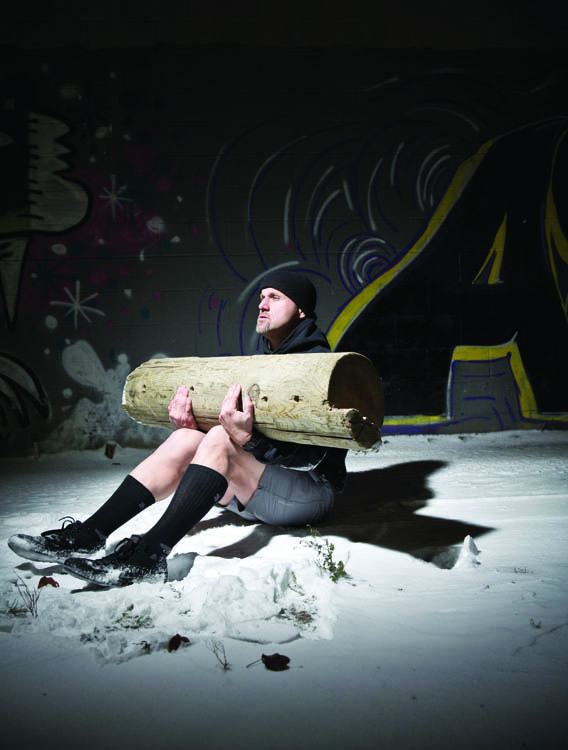“I don’t care about your childhood! You better not quit on yourself right now. Hold this plank for 10 more seconds … 10 seconds … nine … N-I-N-E … eight … E-I-G-H-T … ”
Detroit Tough owner and coach Roger Dyjak leads a morning class at his Corktown gym. We’re in the last stretches of our final plank, and Dyjak is in full yelling mode.
I stop staring at the gray concrete beneath me and look around. To my right is a professional athlete: Her form is perfect, and she’s deep in concentration. Next to her is her sister — she just had a baby 12 weeks ago, and got a tattoo on her foot the day before.
And then there’s me, laughing a tad hysterically and shaking — without a doubt, the least fit person there — and yet somehow, I feel as though we’re all pushing each other through this, as though this plank is something we all have to conquer, together.
Dyjak is standing over me, his foot pointing at my left knee, signaling that I should attempt to get it off the ground. I try, but I’m pleading with him, “I can’t do it. I’m too shaky!”
I’m rather embarrassed by this admission when I look up and read a sign on the brick wall that says, “This is not about you.” I like the idea, but I’m not sure how it applies to a gym. Isn’t working out, setting aside time each week that’s solely dedicated to your personal betterment — well, isn’t that precisely about “you”?
It’s not, at least in Dyjak’s mind.
‘This Is About Us’

Dyjak has been training people for 24 years. When he was going to nursing school, he started the “Train Like a Savage” program in 2010 in metro Detroit — an all-season outdoor weather workout program that attracted a cult following. After appearing on the Start Up television show on the USA Network in 2012, he pursued the idea of owning his own gym. He insisted that it would be in Detroit — his hometown. Detroit Tough opened its doors this past February.
He then developed his signature workout — a combination of bodyweight exercises, kettlebell moves (using weights that resemble cannonballs with handles), and more unconventional workouts that take advantage of the industrial-inspired equipment, such as slamming a sledgehammer against a tire … or taking batting practice on a punching bag.
The class has a clear team-like mentality — participants run and warm up together, work out in a circle facing each other, and finish the class together by running around the block holding a piece of equipment, such as a medicine ball or a sledgehammer (for the more ambitious students).
Tucked in behind the Detroit Institute of Bagels, the gym has a nondescript entrance — more like a garage than a workout facility. The brick walls are decorated with various Detroit memorabilia, including a sign from an original Standard Oil gas station. The walls are also filled with signs that read: “This is not about you,” “this has never been about you,” and “this is about us.”

A piano from the Grinnell Brothers Music House sits next to the entrance, while rock ’n’ roll blares from speakers — a contradiction that somehow works in this space. The gym may seem cold and tough, but it also feels welcoming. You get the sense that people come here to hang out, too.
Dyjak is trying to cultivate a gym where everyone relies on each other and supports one another. “We all work together as a team rather than just putting on headphones and taking selfies,” he says. “I want people to feel like they’re a part of something bigger than themselves. If there’s interaction, people develop trust and bonds.”
He knows everyone who walks in the door by name, but more than that, Dyjak knows them as individuals, which allows him to tease them and establish a more personal relationship.

“If you’ve had a bad day and you don’t want to work out but I say, ‘Hey, come in and we’ll work out together,’ you get that sense that someone actually cares about me. Then you develop a sense of community,” he says.
Robin Runyan, a freelance writer and one of Dyjak’s clients, started coming to Detroit Tough when she moved to Detroit in June. At her old gym, she had a strong fitness family. That’s something she looked for in Detroit, especially because she didn’t know anyone here.
“I felt like I was family right away,” she says. “Roger is very supportive, and he’ll joke around with you a lot.”
But more than that, Dyjak can sense a change in Runyan’s mood. Fitness has been a way for Runyan to manage her depression. She says people are accountable for her at Detroit Tough and would notice if she stopped coming to the gym.
Beyond the Gym Walls
Dyjak believes that support and community created within the walls of Detroit Tough must extend beyond the gym’s walls. He asks members to do at least two hours of community service per month.
“We collect clothes and then we put on backpacks and walk around the city of Detroit passing them out to the homeless,” Dyjak says. “There are over 6,500 homeless veterans in the metro Detroit area so that’s our big drive.”
The gym’s attitude (if a gym can have an attitude) encapsulates the spirit of Detroit. The members of Detroit Tough seem to share a similar goal that has almost nothing to do with exercise — they’re there to support the gym, each other, and Detroit. And sure, they’re going to get a great workout, too.
|
|
|










